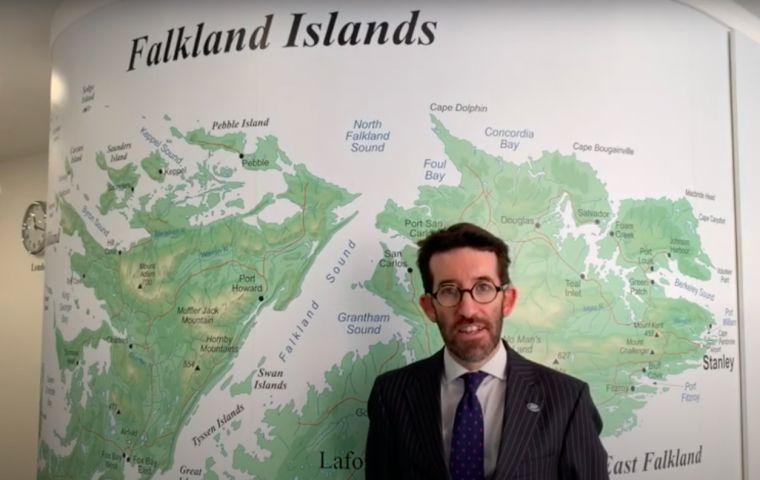MercoPress. South Atlantic News Agency
Falklands Day celebrated with a presentation at FIGO in London
 Representative Richard Hyslop together with lawmakers remarks in the presentation that the Falklands Day is “the day we remember the first recorded sighting of the then uninhabited Falkland Islands”
Representative Richard Hyslop together with lawmakers remarks in the presentation that the Falklands Day is “the day we remember the first recorded sighting of the then uninhabited Falkland Islands”  Lawmakers MLA Teslyn Barkman and MLA Mark Pollard, made a presentation of how the Islands have evolved into a self sufficient, self governing, democratic and dynamic community
Lawmakers MLA Teslyn Barkman and MLA Mark Pollard, made a presentation of how the Islands have evolved into a self sufficient, self governing, democratic and dynamic community Falklands Day is the celebration of the first sighting of the Falkland Islands by John Davis in 1592 and is commemorated on 14 August. It was once seen as the National Day of the Falklands but has largely been replaced by Liberation Day which commemorates the end of the Falklands War.
Falkland Day ceased is to a public holiday in 2002 when the Executive Council moved the holiday to provide for the re-introduction of Peat Cutting Monday, on the first Monday in October.
The date marks the first recorded sighting of the Falklands on 14 August 1592 by English explorer John Davis who captaining the 120-ton vessel ‘Desire’ in that month was blown by a storm into ‘certaine Isles never before discovered’. Davis account was published in 1600 in London by Richard Hakluyt.
The Falklands’ coat of arms motto is precisely “Desire the right” in honor to Davis and includes an image of his vessel ‘Desire’.
According to the brief history of the Falklands, Davis was followed by the English seaman Sir Richard Hawkins in 1594 and the Dutch explorer Sebald de Weert who visited in January 1600. The first recorded landing on the uninhabited islands took place on West Falkland on 27 January 1690, when the English sea captain John Strong came ashore.
For many years in the European continent the Falklands were known as the ‘Sebaldines’ in honor of the Dutch explorer Sebald de Weert.
Strong named the passage between the two Islands ‘Falkland’s Sound’ and Lord Falkland’s name later became attached to the entire main Islands group. In the early eighteenth century French sailors from the port of St Malo gave their name to ‘Les Iles Malouines’.
More than half a century later, in the 1760s, two settlements were established in East and West Falkland almost simultaneously by two different countries.
The French nobleman Louis Antoine de Bougainville, in a brief chapter of his remarkable life, landed settlers who had left Nova Scotia after the British conquest of French Canada at Port Louis in East Falkland in 1764.
In January 1765 Admiral Byron landed at Saunders Island north of West Falkland and claimed the isles for the crown of Great Britain. A second British expedition in 1766 returned to Saunders and named their settlement Port Egmont. They built houses and a prefabricated blockhouse and planted gardens.
Although British and French colonists became aware of each other’s activities relations were polite, helped no doubt by the distance between Port Louis and Saunders Island.
But in 1767 Bougainville was obliged to sell his settlement to the Spanish crown, which resented a foreign colony in what it considered its sphere of influence.
The Spaniards took over Port Louis which they named Puerto de la Soledad. Keen to assert their authority, a Spanish fleet arrived at Saunders Island in 1770 and obliged the small British garrison to leave. An international crisis followed, which was only resolved in 1771 when Spain agreed that the British settlement should be restored and three ships sailed out to re-establish British authority in September 1771.




Top Comments
Disclaimer & comment rules-

-

-

Read all commentsArgentina’s Falklands claim is based on lies and misinformation .
Aug 16th, 2020 - 11:08 am +3Evidence: Ruda’s UN Speech, the Basis of Argentina’s Falklands Sovereignty Claim Debunked (3 pgs): https://www.academia.edu/43652542/Rudas_UN_Speech_the_Basis_of_Argentinas_Falklands_Sovereignty_Claim_Debunked
And I think that you are talking through your rear, old fraud. It was a sighting, not a claim. The claim came with Hawkins, two years later in 1594. Not that it matters. Claims are of no consequence without effective occupation. Britain knew that, tho Spain denied it. Occupation would be 1766. Spain never did claim discovery of the Falklands. Not in all the arguments of 1770/71. Not once.
Aug 17th, 2020 - 02:10 pm +3You need to read more, while you still have some wits left ;-)
Get it?
Good night, old 'un.
Stink
Aug 15th, 2020 - 06:11 pm +2The Engrish Pirates don’t claim the first sighting of the Islands, they claim the first CONFIRMED sighting, as they went back a year later and started charting the islands.
Others had reported sighting islands, which may or may not have been them.
“All of those hundreds of maps and tons of documentation”, and no proof.
No proof, no truth.
Commenting for this story is now closed.
If you have a Facebook account, become a fan and comment on our Facebook Page!